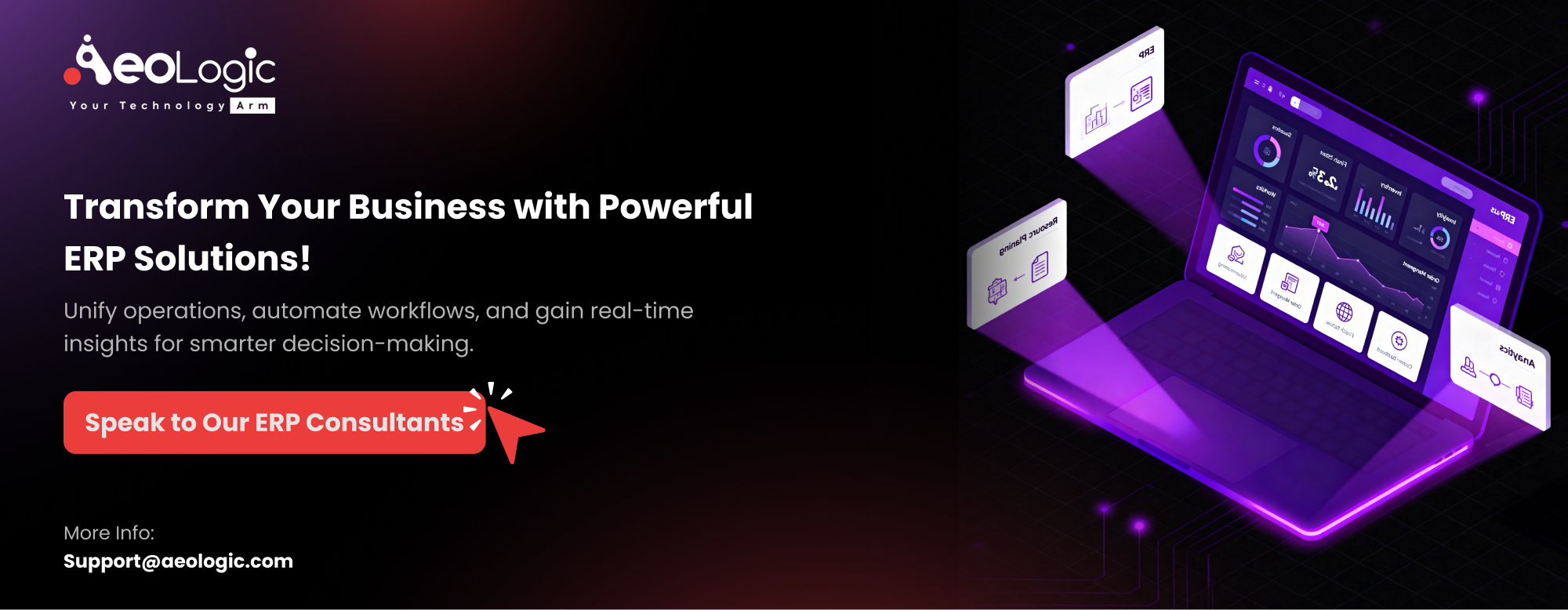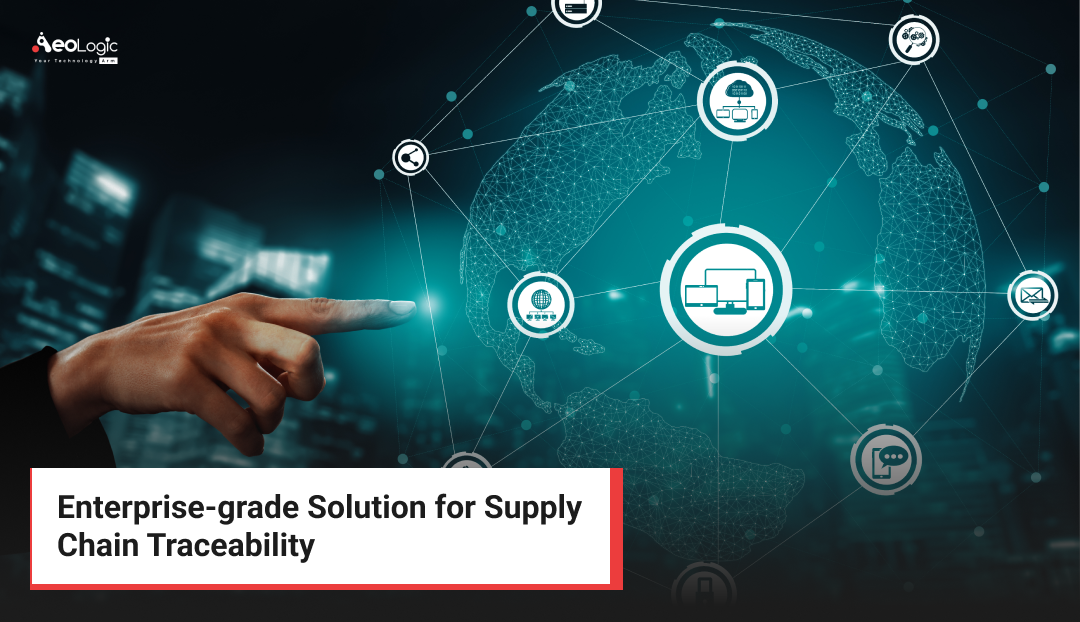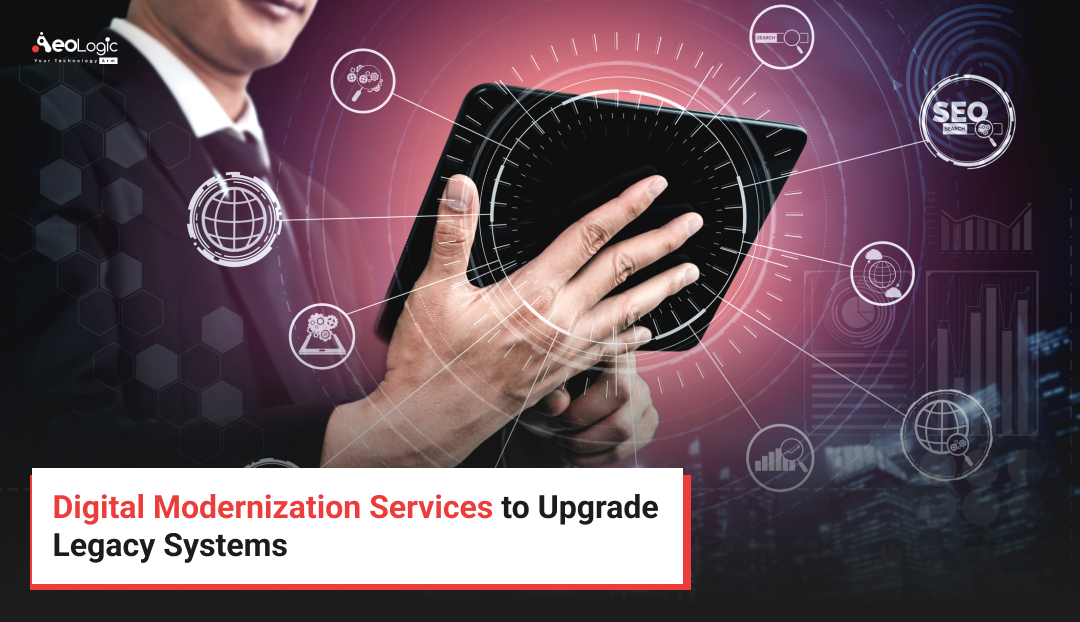Platforms for enterprise resource planning (ERP) are no longer just “large company software.” In 2026, ERP has become the backbone of modern digital businesses across manufacturing, retail, logistics, healthcare, BFSI, the public sector, and more. As organizations demand real-time visibility, automation, accuracy, and seamless departmental connectivity, the Benefits of Implementing ERP Solutions have become essential for business growth and operational excellence.
Whether a company is scaling, optimizing productivity, or preparing for AI-driven digital transformation, the ERP solutions benefits 2026 are stronger, smarter, and more future-ready than ever—delivering intelligence, speed, and efficiency at every level of the organization.
AI, IoT, automation, low-code workflows, and real-time analytics are already being integrated directly into ERP systems by digital transformation partners like Aeologic Technologies, allowing businesses to function quickly, accurately, and intelligently.
Why ERP Solutions Are More Important Than Ever in 2026
The business environment has undergone significant transformation.
Leaders expect real-time dashboards to make confident decisions, employees expect seamless tools, and customers expect faster delivery.
Here’s the actual difficulty, though:
- The data is dispersed.
- The procedures are done by hand.
- Teams operate independently.
- It takes hours (or days) to report.
- Companies use dozens of disparate tools.
Inefficiency, delays, errors, and needless expenses result from this.
ERP can help with that.
In 2026, modern ERP systems are more than just management software; they are sophisticated business engines that facilitate decision-making, automate procedures, and unify data.
The top 10 advantages of deploying ERP solutions in 2026 are thoroughly examined in this article, which is supported by actual cases, useful insights, and expert-level analyses.
One of the most important Benefits of Implementing ERP Solutions is improved visibility and unified data.

Benefit 1: Single Source of Truth and Real-Time Visibility
The quick transition from dispersed information to unified, real-time visibility is one of the main advantages of implementing ERP solutions.
What Companies Face
The majority of businesses use a variety of tools to manage operations:
-
One inventory system
-
One for sales
-
One for the accounting department
-
One more for HR
-
And dozens of Excel files
Delays, discrepancies, and insufficient information result from this.
How ERP Resolves It
By 2026, all functions will be integrated into a single ecosystem thanks to modern ERP platforms:
-
Sales
-
Stock
-
Purchasing
-
Money
-
Manufacturing
-
HR
-
chain of supply
-
Customer Support
Everything is synchronized, centralized, and updated instantly.
Real-World Example
An AI-enabled ERP with IoT tracking was implemented by a mid-sized manufacturer in collaboration with Aeologic Technologies. Prior to ERP:
-
There was a delay in inventory updates.
-
The accuracy of order fulfillment was only about 82%.
-
There was a lack of team coordination.
Following ERP:
-
100% real-time stock visibility
- Planning purchases automatically
- In just three months, order accuracy increased to 97%.
Why This Matters in 2026
Business speed is everything.
Real-time visibility makes it possible to:
- Quicker choices
- Decreased mistakes
- Improved client satisfaction
- Precise prediction
A business can become much more competitive just by doing this.
Benefit 2: Automation That Removes Human Errors and Manual Labor
ERP systems in 2026 have become automation powerhouses. These automation capabilities highlight major Benefits of Implementing ERP Solutions for modern businesses.
They improve process consistency, cut down on team workload, and do away with repetitive tasks.
Activities That ERP Automates
-
Purchase order generation
-
Invoice creation
-
Inventory updates
-
Stock transfers
-
Production planning
-
Quality checks
-
Payroll processing
-
Compliance documentation
-
Sales pipeline updates
The Effects of Automation on Actual Productivity
With automation:
-
Employees spend more time on strategic tasks
-
Managers get accurate data without chasing teams
-
Processes run on autopilot
-
Human errors drop dramatically
-
Operation cost decreases
Micro-Case Situation
A retail chain working with Aeologic Technologies automated:
-
Inventory reordering
-
GRN (Goods Received Notes)
-
Stock reconciliation
The outcome?
-
80% fewer instances of stockouts
-
60% faster procurement cycles
-
40% reduction in manual labor
Why Automation is a Game-Changer in 2026
Businesses that use automated ERP workflows grow more quickly, react more quickly, and make more money.
Automation is equal to speed, cost savings, and efficiency.
Benefit 3: Quicker Accounting & Better Financial Management
Finance departments benefit massively from ERP implementation in 2026.
Typical Financial Difficulties
Without an integrated system:
-
Accounting is manual
-
Reconciliation takes days
-
Tracking expenses is painful
-
Financial reporting is slow
-
Compliance becomes complicated
ERP Streamlines Finance from Start to Finish
Modern ERPs automate:
-
Journals & ledgers
-
Budgeting
-
Cash flow
-
Tax compliance
-
AP & AR
-
Audit trails
-
Expense management
Real Example
A distribution company using Aeologic’s ERP integration reported:
-
50% faster financial closing
-
100% traceable audit trails
-
40% improvement in cash flow visibility
Why This Matters in 2026
Businesses are running on narrower profit margins.
Stronger decisions and lower risks result from instant financial clarity.
Additionally, CFOs and finance directors can plan with unprecedented accuracy thanks to AI-enabled forecasts.
Benefit 4: Quicker Service Delivery & Improved Customer Experience
In 2026, customers have high expectations for quicker delivery, clear updates, and individualized care.
ERP helps companies meet these expectations.
How ERP Enhances Client Experience
-
Faster order processing
-
Real-time tracking
-
Accurate delivery estimates
-
Automated service workflows
-
Better product availability
-
Unified customer histories
-
Faster issue resolution
Example from the Field
A logistics and last-mile delivery startup implemented ERP with API-based tracking.
Before ERP:
-
Delivery SLAs were inconsistent
-
Customers lacked visibility
-
Complaint resolution was slow
After ERP:
-
SLA adherence improved from 76% → 94%
-
Customers received live shipment updates
-
Support teams reduced handling time by 50%
Why This Matters in 2026
Business survival is correlated with customer loyalty.
ERP helps offer fast, transparent, error-free service.
Benefit 5: Efficient Supply Chain and Complete Optimization
Supply chain transformation is one of the best advantages of ERP solutions in 2026.
Supply chains today are complex:
-
Multiple vendors
-
Dynamic demand
-
Unpredictable delays
-
Price volatility
-
Cross-border compliance
ERP brings order to this complexity.
This is one of the core Benefits of Implementing ERP Solutions for end-to-end supply chain optimization.
ERP-Enabled Supply Chain Features
-
Real-time stock visibility
-
Automated demand forecasting
-
Vendor performance tracking
-
Automated procurement
-
Route optimization
-
Warehouse management
-
IoT-enabled tracking
Example
A large FMCG business partnered with Aeologic Technologies for an ERP + IoT supply chain upgrade.
After implementation:
-
Stock discrepancies dropped by 90%
-
On-time dispatch improved drastically
-
Procurement cost reduced by 12%
-
Warehouse efficiency grew by 45%
Why This Matters in 2026
A company with a smart supply chain outperforms competitors.
ERP gives businesses agility, accuracy, and resilience.
Benefit 6: AI-Powered Predictive Analytics and Better Decision-Making
ERP systems are no longer merely record-keeping tools in 2026; they are now sophisticated tools for making decisions.
Businesses can anticipate outcomes rather than respond to them thanks to the integration of AI, ML, IoT, and RPA into contemporary ERP platforms.
How Business Decisions Are Transformed by Predictive Analytics
-
Forecast demand based on trends
-
Predict equipment failures
-
Optimize workforce planning
-
Identify potential cash flow challenges
-
Recommend best-performing vendors
-
Detect fraudulent patterns
-
Predict customer behavior
This level of intelligence wasn’t possible with traditional ERP systems.
Real Example
A manufacturing unit using an ERP deployed by Aeologic Technologies integrated IoT sensors on machines to monitor vibrations, temperature, and power usage.
Using predictive analytics:
-
Maintenance downtime reduced by 70%
-
Unexpected machine failures dropped drastically
-
Production continuity improved by 40%
This is a real demonstration of how AI-enabled ERP solutions benefits 2026 are reshaping industries.
Why It Matters
Predictive analytics gives leaders confidence.
Instead of guessing—businesses now know what will happen before it happens.
That’s a massive competitive advantage.
Benefit 7: Future-Ready Digital Architecture & Scalability
One overlooked Benefit of Implementing ERP Solutions is scalability.
Systems must grow with businesses without malfunctioning, slowing down, or getting too costly.
How Scalability Is Supported by Modern ERP
-
Add new branches or warehouses instantly
-
Expand to new countries or regions
-
Increase product lines
-
Handle more users without performance issues
-
Integrate new technologies (AI, IoT, RPA, CRM, WMS, POS, etc.)
Example
A D2C brand’s daily orders increased from 20 to more than 2,500.
They were drowning in prior to ERP:
-
Inconsistencies in stock
-
Slow order processing
-
Postponed dispatch
-
Consumer grievances
After implementing a scalable ERP:
-
Scaling operations became seamless
-
New sales channels (Amazon, Flipkart, Shopify) synced automatically
-
Warehouse expansion took hours, not weeks
This is the future of scalability—plug-and-play business growth.
Why It Matters in 2026
Businesses require agility.
Those who scale more quickly will endure.
Businesses can expand indefinitely with a scalable ERP. This scalability remains one of the long-term Benefits of Implementing ERP Solutions in 2026.
Benefit 8: Improved Risk Management, Security, and Compliance
The number of cyberattacks has significantly increased.
There is more regulatory scrutiny.
Data privacy is essential.
For this reason, one of the most important advantages of ERP solutions in 2026 is ERP security.
Modern ERP’s Security Features
-
Role-based access
-
Audit trails
-
Real-time monitoring
-
Built-in data encryption
-
Multi-factor authentication
-
Automated backups
-
Anomaly detection
-
Compliance workflows
Regulatory Assistance
Modern ERP systems support compliance for:
-
GST
-
E-invoicing
-
ISO
-
FDA
-
HIPAA
-
GDPR
-
SOC2
-
Industry-specific regulations
Example
A healthcare chain using Aeologic Technologies’ ERP enhanced:
-
Data access control
-
Audit logs
-
Patient information protection
This helped them pass compliance audits with zero penalties.
Why It Matters
Data breaches can destroy a business.
ERP systems provide control, governance, and complete security.
Benefit 9: Overall Operational Efficiency & Cost Savings
Cost savings is one of the most alluring advantages of implementing ERP solutions.
Although ERP seems like a big investment initially, the ROI is significant.
Direct Cost Savings
-
Reduced manual labor
-
Lower inventory carrying cost
-
Decreased procurement cost
-
Fewer stockouts & excess stock
-
Lower operational wastage
-
Automated financial reporting
Savings on Indirect Costs
-
Improved decision-making
-
Increased client retention
-
Faster fulfillment
-
Workforce allocation that is optimized
Real Example
Aeologic Technologies and a manufacturing company collaborated on ERP and automation.
Prior to ERP:
-
High waste of materials
-
Production delays
-
Errors made by hand
-
Absent forecasting
After ERP:
-
Monthly cost savings of 18%
-
Reduced scrap material by 22%
-
Faster month-end closing
-
Seamless production planning
Why It Matters in 2026
Businesses are under pressure to reduce operational costs.
ERP gives them the tools, automation, and insights to do it efficiently.
Benefit 10: Enhanced Teamwork and Employee Efficiency
ERP brings people, processes, and departments together.
By breaking silos, companies become more aligned and efficient.
How ERP Increases Employee Productivity
-
One shared dashboard
-
Defined roles & responsibilities
-
Automated approvals
-
Cross-department visibility
-
Faster internal communication
-
Mobile ERP apps for field teams
ERP’s Digital Collaboration Tools
-
Task management
-
Workflow automation
-
Document management
-
HRMS integration
-
Performance analytics
Example
A field service company using Aeologic’s mobile ERP:
-
Reduced field-to-office communication delays by 70%
-
Delivered faster service
-
Improved employee satisfaction due to streamlined processes
Why It Matters in 2026
Hybrid work, remote teams, and fast-moving industries need solid collaboration tools.
ERP does exactly that.
Typical Errors Companies Make When Using ERP (And How to Prevent Them)
Even the best ERP fails when implemented incorrectly.
Here are the most common mistakes:
Mistake 1: ERP Selection Based on Cost Rather Than Fit
Solution: Assess integration requirements, cloud support, industry fit, and scalability.
Mistake 2: Not Including Important Departments
Solution: Leaders in finance, operations, inventory, HR, and IT should always be included.
Mistake 3: Undervaluing the Migration of Data
Solution: Before the ERP goes live, clean the data. Don’t transfer outdated mistakes to the new system.
Mistake 4: Lack of defined KPIs or objectives
Solution: Describe the desired results, such as lower costs, improved forecasting, and quicker reporting.
Mistake 5: Insufficient Training
Solution: Continually provide documentation and training.
Mistake 6: Disregarding Change Management
Solution: Employees should be informed of benefits early on to prevent resistance.
Mistake 7: Putting Everything into Practice at Once
Solution: Take a modular approach. Start with the most important modules and work your way up.
Understanding the key Benefits of Implementing ERP Solutions can also help companies avoid these mistakes and plan better.
Professional Advice for Effective ERP Implementation (Based on Practical Experience)
Here are some useful insights from experts who have examined hundreds of ERP implementations, including those by Aeologic Technologies:
Put “Business First, Technology Second” first.
Define the business problems before selecting a system.
Avoid Over-Customization
The more customizations, the harder maintenance becomes.
Early Automation, CRM, and IoT Integration
The true power of ERP comes from integrations and ecosystem expansion.
Create Internal Champions
These are team members who guide others during and after implementation.
Use Cloud ERP by 2026.
It is scalable, secure, faster to deploy, and cost-efficient.
Employ Actual KPIs
Use metrics such as these to gauge success:
-
Accuracy of orders
-
Turnover of inventory
-
SLA compliance
-
The price per purchase
-
Efficiency of production
Join Forces with a Skilled Provider
Collaborating with professionals such as Aeologic Technologies guarantees:
-
Quicker deployment
-
Workflows unique to a given industry
-
Personalized integrations
-
Smooth automation
-
Architecture that is scalable
Conclusion
In summary, the advantages of implementing ERP solutions extend well beyond the adoption of software. These advantages represent the core Benefits of Implementing ERP Solutions for businesses preparing for the future.
They support companies:
-
Utilize real-time data
- Eliminate human error
- Boost client satisfaction
- Boost financial well-being
- Automate procedures
- Easily scale
- Boost the capacity of the supply chain
- Cut down on operating expenses
In 2026, intelligence, automation, speed, and accuracy will provide a competitive edge.
And that is made possible by ERP systems, particularly when they are used by transformation partners like Aeologic Technologies.
ERP is now required if a company wants to be scalable, resilient, and future-ready.
It’s a strategic imperative.
FAQs
Q1. In 2026, what are the primary advantages of putting ERP solutions into practice?
Real-time visibility, automation, stronger financial control, better customer experience, better supply chain management, AI-powered analytics, improved security, cost savings, and increased productivity are among the main advantages.
Q2. How does ERP increase the effectiveness of the supply chain?
ERP synchronizes vendors, warehouses, dispatch, inventory, and procurement. It provides IoT-enabled visibility, automated forecasting, and real-time tracking.
Q3. Can small and medium-sized businesses use ERP?
Of course. In 2026, cloud ERP solutions are scalable, modular, and reasonably priced—ideal for small and medium-sized businesses. They can begin modestly and grow as the company does.
Q4. What is the ERP implementation’s return on investment?
Because of lower labor costs, fewer mistakes, better forecasting, quicker reporting, and improved decision-making, most businesses see a return on investment in 6 to 18 months.
Q5. What makes ERP crucial for managing finances?
ERP reduces errors and increases financial accuracy by automating accounting, tax compliance, cash flow management, budgeting, and reporting.
Q6. In what ways does ERP enhance customer service?
By providing quicker order processing, accurate inventory visibility, real-time updates, and individualized customer records.
Q7. Which sectors gain the most from ERP?
The industries most affected are manufacturing, retail, logistics, healthcare, automotive, public safety, BFSI, and eCommerce—particularly with AI-integrated ERP systems.

Manoj Kumar is a seasoned Digital Marketing Manager and passionate Tech Blogger with deep expertise in SEO, AI trends, and emerging digital technologies. He writes about innovative solutions that drive growth and transformation across industry.
Featured on – YOURSTORY | TECHSLING | ELEARNINGINDUSTRY | DATASCIENCECENTRAL | TIMESOFINDIA | MEDIUM | DATAFLOQ





